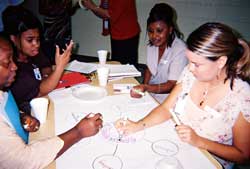New Teacher Academy Expanding Rapidly
One of the worst headaches a school administration can face is having a sky-high attrition rate for new teachers. In addition to the administrative costs of losing a teacher and finding a new one, which some studies have priced at up to $60,000, attrition makes it exceedingly hard to train an experienced faculty and maintain a sense of community.
Since 1998, the Teachers College New Teacher Academy (NTA) has been working with some of the hardest-hit schools, dramatically increasing new teacher retention. In past years the NTA's programs have been expanding exponentially around the nation, succeeding in districts as different as Harlem and Moss Point, Mississippi, where the project was recently awarded a $10,000 grant.
The New Teacher Academy began as part of Kate Unger's doctoral work at Teachers College. Unger, who still serves as director of the NTA, worked with a Brooklyn school where half of all new teachers were leaving the profession, much less the district, within a year. By creating a system that focused on literacy, community, standards and leadership within a structure of regular new teacher meetings with mentors and peers, she raised the retention rate to around 90 percent, which has held fast for other schools.
In addition to the 18 peer meetings a year, which are structured with a cohort of 20 new teachers and two experienced teachers trained by NTA to work as facilitators, the New Teacher Academy sponsors several events and projects throughout the year. These projects include showing new teachers how to write curriculum-enhancing proposals, which the NTA funds, to an end-of-the-year gala. Last year's gala was held in Lerner Hall, which Vane Lashua, NTA Assistant Director, called a "mega-event." The purpose of these events, Lashua said, is to make teachers feel like they're earning respect.
The New Teacher Academy has grown rapidly since the days when Unger used to tread the path to Brooklyn alone. More than 600 people are involved now, Unger said, and that could soon top 1,000 if proposed new projects in spots like Nevada, New Mexico, or even the Bahamas are developed. By the end of this year, Unger said, the New Teacher Academy could directly or indirectly enrich the lives of 1.3 to 1.4 million students.
Even though NTA is in some ways becoming a "college within a college," serving as the framework for dissertations and accruing financial support, Unger stressed that the Academy is "totally TC" and implements the latest research and practices developed at Teachers College.
Unger said she is honored to have the project sponsored by TC Innovations as part of the College's tremendous history of contributions to education. "To have a little grain of sand embedded in that legacy is a humble gift and opportunity," she said.
As the program spreads across the country, it faces the problem that, as Lashua said, "The United States has 50 educational systems." But Lashua noted that the needs of new teachers-such as general mentoring and appreciation -are similar everywhere, so it works in a variety of places.
The problem of district stability is more troubling. Unger said that District 5 in Harlem is on their fourth superintendent since NTA started working with the district in 2001. "On the other hand, I've never seen such a window of opportunity for positive good work," she said. "All this new energy (from new teachers) coming in to work with children is a tremendous blessing of opportunity."
What is the New Teacher Academy's ultimate goal? "Education should be an ecstatic experience," Unger said. "I've always wanted kids to say, ‘Oh no, it's Sunday! I can't go to school!'"
Published Friday, Jan. 14, 2005
